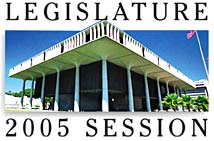Unpaid fines
cost Hawaii millions
A state senator wants to
crack down on warrants
not served because of staffing
An estimated 75,000 warrants, including 74,311 warrants for traffic offenses, are outstanding because there are not enough state sheriffs to serve the warrants, according to the state Public Safety Department.
Sen. Suzanne Chun Oakland estimates the state is losing millions of dollars in uncollected fines because of a lack of enforcement.
|
|
"We need law enforcement officers to serve the warrants and we are totally understaffed," Chun Oakland said.
Her legislation would increase the bench warrant serving fees by $5 from its existing $30 with the money going into a revolving fund for the state to hire more deputy sheriffs.
About 27,500 warrants are issued every year for offenses ranging from driving without a license, contempt of court for failing to show up for a traffic ticket, failure to complete a community service sentence or not taking an alcohol abuse class.
Mike Gaede, spokesman for the Public Safety Department, which runs the sheriff's office, said the state now has 12 deputy sheriffs serving warrants.
"The priority is on serving felony warrants, grand jury cases," Gaede said.
Also, the police will pick up someone for having an outstanding warrant if they are stopped for another offense, such as a traffic violation.
"The HPD just picked up someone last week who had $15,000 worth of outstanding warrants," Gaede said.
Chun Oakland says in the past the sheriff would announce a sweep to clean up ticket backlogs.
"Once the word gets out on the street, people start to pay their traffic fines, so it doesn't have to be an arrest of every single person," Chun Oakland said.
Jim Fulton, executive assistant to the city prosecutor, said the Prosecutor's Office also serves warrants, but "the sheriff is the bulk server of warrants."
"If someone gets indicted, we are out there serving warrants, also revocations, such as when a bail or parole is revoked," Fulton explained.
An undetermined number of outstanding warrants have already been dropped from the rolls because the state Judiciary is switching over to a new computer system.
Jean Yamane, deputy chief court administrator, said her tally from last year had between 70,000 and 91,000 outstanding bench warrants, with some as old as 15 to 20 years.
But the courts didn't want to type in thousands of old bench warrants that no one had any hope of ever collecting, so Yamane said the courts have been dropping the old warrants.
"We had a project where we worked with the Prosecutor's Office and our administrative judge to see about doing ex-parte motions and order for lack of prosecution to dismiss some of the bench warrants," Yamane said.
Yamane said she didn't know how many warrants have been erased, but one official in the sheriff's office, who asked not to be named, said it was in excess of 20,000.
Chun Oakland said she had been told by public safety that more than 10,000 old warrants were dropped from the rolls.
Iris Moriyama, the assistant court administrator in charge of the project, declined to comment on how many cases have been dropped.
While bench warrants are issued for more serious infractions, most unpaid or ignored traffic tickets do not result in a warrants, according to Yamane.
"For decriminalized traffic cases, if a person doesn't pay the ticket or doesn't send in a written statement or come to court, our court will issue a judgment in favor of the state," Yamane said.
The court will then turn the matter over to the state attorney general's office to collect the fines. The court will also tell the county driver's license bureau to put a hold on the person's license until the fine is paid.
"The court's stoppage on your license is our main sanction; we put a flag on their license renewal saying to come to court because you have some unfinished business. That brings some people here," Yamane said.
If you ignore a parking ticket, the court puts a hold on renewing your car registration.
Examples of traffic criminal offenses that would result in a warrant if you ignore them include reckless driving, driving without a license, racing on the highway, no-fault insurance and high-occupancy vehicle (HOV) lane violations.
Examples of traffic infractions that if ignored would result in a civil fine, but no warrant, include speeding, running a red light or crossing a solid line, according to the state judiciary.
[News] [Business] [Features] [Sports] [Editorial] [Do It Electric!]
[Classified Ads] [Search] [Subscribe] [Info] [Letter to Editor]
[Feedback]

